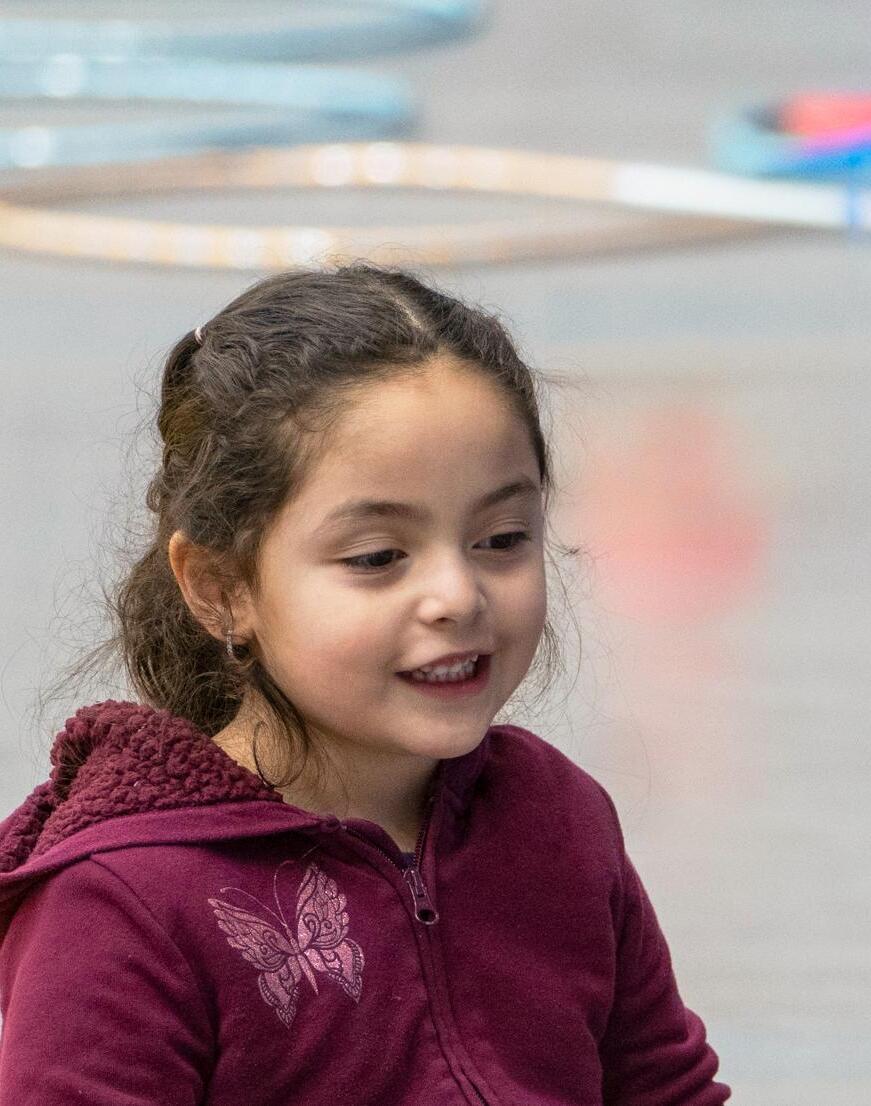
Issue 1, Volume 2 June 2024

Everyone is unique, but some differences still seem to cause inequalities in our society. Bethesda strives for inclusivity of people, educating our community that all differences are valuable. You will learn how simply being treated equally can positively impact a person as you read this latest edition of INSPIRE.
As children, we experience a heightened period of change and growth. For some, this can be overwhelming and cause concerning behaviours. For children with Autism, Bethesda is here to assist and develop programs that are uniquely designed to meet a person’s needs. Learn about Bethesda’s Urgent Response Program, and other programs, and how we can help on pages 14, 20, 26 and 28.
Collaboration is pivotal to Bethesda.
It is paramount that the people and families we support have a voice when planning services and supports. They know themselves and their loved ones best and their needs can change over time. This can include increasing or reducing supports as needed, helping siblings to bond, or taking some time for self-care through Respite.
We also could not do all that we do without the
Paul McGowan Chief Executive Officer
assistance of our community partners.
Collaborating with other organizations that value inclusivity to provide experiences to people such as youth with work experience or joining forces with us in initiatives such as World Autism Day or Pink Shirt Day. It is through collaboration that you really see magic happen.
Bethesda believes that innovation goes handin-hand with providing quality services. In this edition, learn how Virtual Reality is breaking down barriers for children by catering to each child’s learning needs.
I hope this issue inspires you with the knowledge that there is help for those who need it- through Bethesda, through the community, and through self-advocacy. Help to move the scale to a more balanced outlook of people to ensure a world where everyone can live their best lives. Where everyone is equal. n
2

It is paramount that the people and families we support have a voice when planning services and supports.
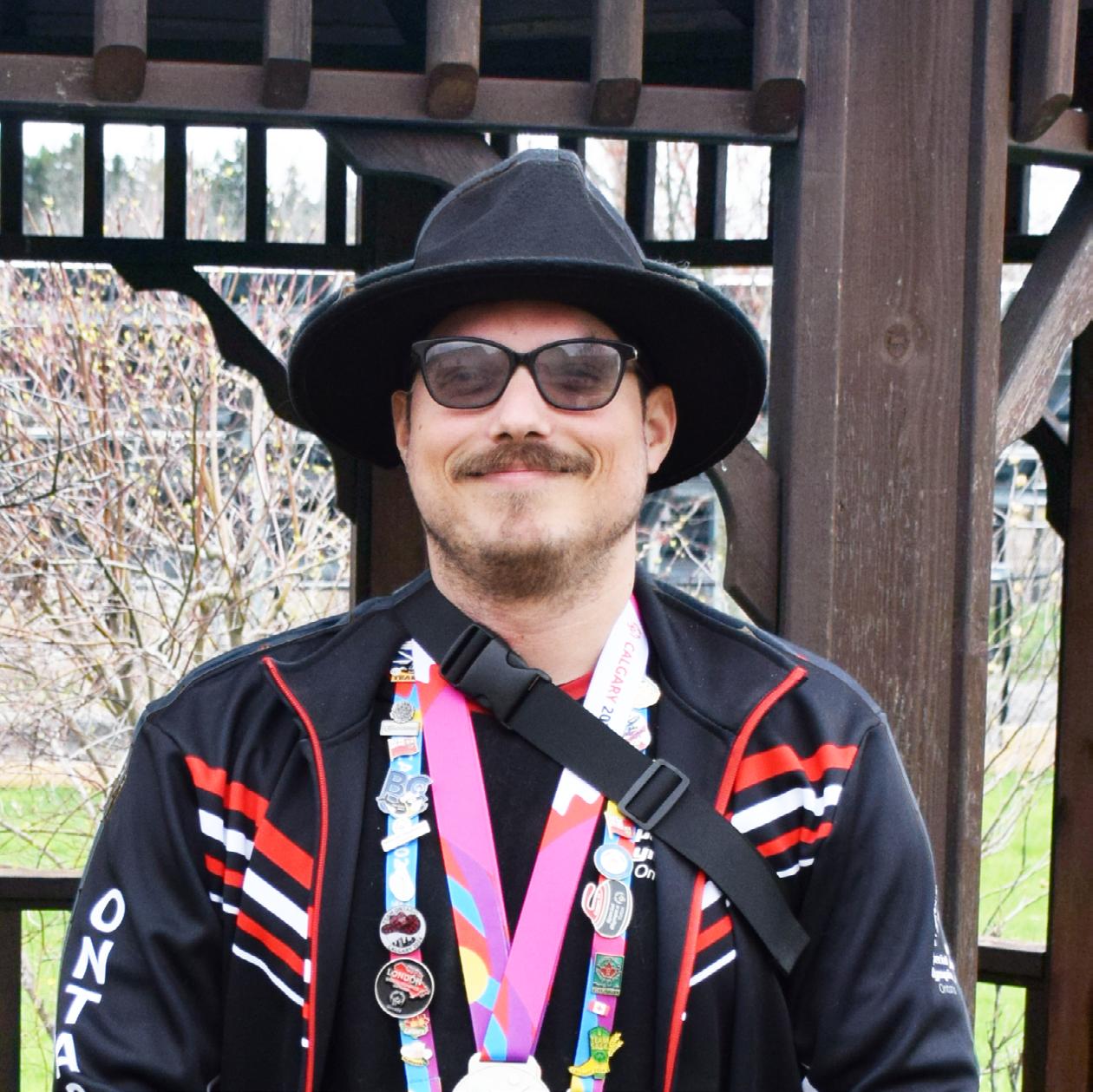
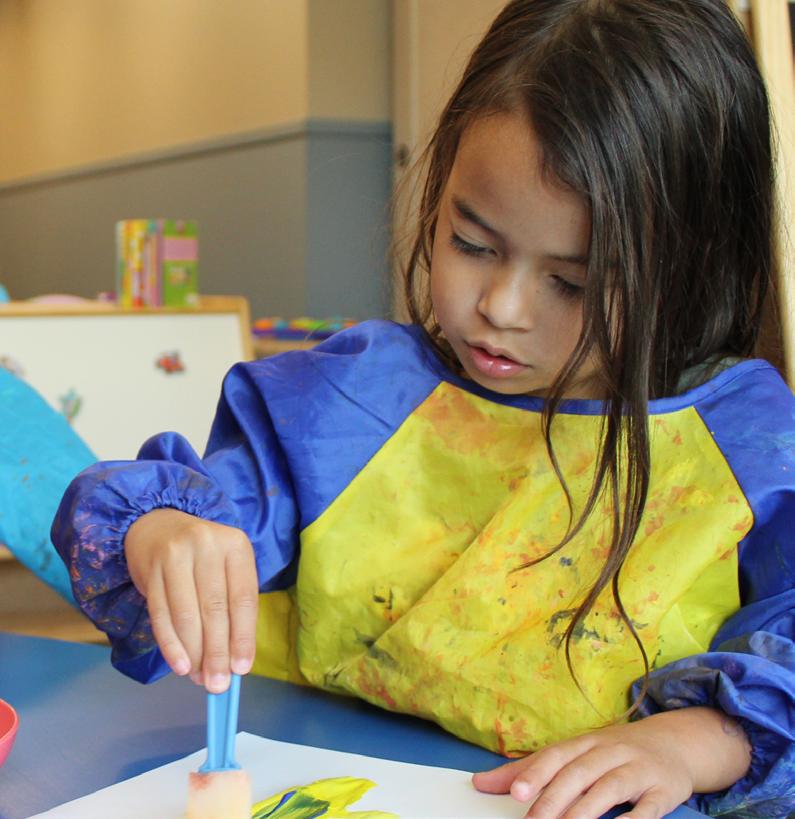
4
Real Inspirational Stories
5
6 Champion Spirit: Jeremy Walsh 10 Virtual Reality: Breaking Barriers 12 Empowering Social Skills to Tackle Bullying 14 The Power of Respite Care 16 Board Spotlight: Kevin Steinstra 18 Board Spotlight: Beth Vanstaalduinen 20 Navigate to Success 22 The Glass Child 26 Thriving at Home: In-Home Care 28 Lifeline for Families: Urgent Response Service 32 Bethesda Culture | Testimonials 36 Community Partner Spotlight: C.R.Smith 38 Foundation 42 Supporting Bethesda
Champion Spirit: Beyond the Medals
Special Olympics Athlete Inspires with Independence and Teamwork
Jeremy Walsh thrives in his own independence. More than that, he uses his voice to encourage others to chase their biggest dreams.
He embodies the Special Olympic oath, “Let me win. But if I cannot win, let me be brave in the attempt.” And though he walked away with several medals during the Special Olympics Canada Winter Games, Canadian National Bowling Championships in Calgary from Feb. 26 to March 3 this year, he says the awards are not what he is most proud of.
“The thing is it’s not about the medal. It’s not about medals, trophies, you name it. What makes Special Olympics inspiring to me is the good memories that I take home,” Jeremy says. “Did I make any friends while I was out there? Did I learn something while I was out there?”
He learned that celebrating with the team is far more important than standing on the podium alone receiving praise for his own accomplishments. “It’s not ‘Good job Jeremy’. It’s ‘Good job team Ontario number nine’. We work together as a team. Everyone is equal; it’s what inspires me to be a Special Olympic athlete.”
Competing in 5-pin bowling, Jeremy’s team secured a Bronze medal, while his individual skills earned him a Silver. His team-oriented attitude extends beyond the
bowling lanes, helping Jeremy thrive in his personal and professional life.
He finds joy in his part-time job at Little Caesars. He spent 10 years as a welcoming face for Little Caesars, holding the signature Shaker Board before transitioning to a new role in the kitchen. After the shaker board position was discontinued at his location four years ago,
“The thing is it’s not about the medal.”
6
Featured
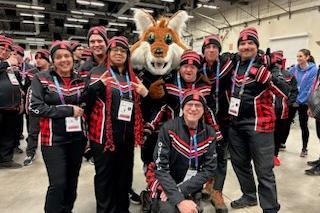

7
Jeremy says he jumped at the opportunity to take his experience inside to the kitchen. There, his roles include “dressing” which is preparing the pizza with toppings, “landing” which is packaging the cooked pizzas, and ensuring the pizzas are kept “hot and ready” in the oven to be served quickly to customers. His favourite part of the job is doing the hands-on work in the kitchen.
Jeremy is 37 and has a learning disability; he began receiving supports from Bethesda at 18 years old. He lived with a matched family for a few years but transitioned to Bethesda’s Supported Independent Living (SIL) when he expressed a desire to live more independently after the family left the program.
In 2006, Jeremy started living on his own with some assistance through SIL. Since transitioning into SIL, which encourages personal choice, independence and community participation, Jeremy says he has never been happier; he prefers to live by his own rules.
“Ever since I became so independent, I don’t like living
by rules. I live by the rules that are the law, like for example paying your rent on time and making sure your bills are paid. Those kind of rules I don’t mind following. But if I had to be told at 37 years old what time to go to bed, I don’t like that.”
Jeremy won’t let a learning disability define him. He passionately encourages others facing barriers, whether a disability, perceived roadblock or fear of failing, to rise to the challenge.
“They’re saying to themselves, this gentleman Jeremy, he’s amazing. I mean, he’s sitting there telling everybody about his successes. And they’ll say, well, I’m not successful.
“I don’t want to hear you say you’re not amazing and you’re not successful. You can achieve anything if you set your mind to it.”
Jeremy emphasizes that you have to want to achieve these goals. “Do you want to achieve your goals? Or do you want to sit there and say you’re not successful?” n

8
Featured
I don’t want to hear you say you’re not amazing and you’re not successful. You can achieve anything if you set your mind to it.
9
Level Up Social Skills: Virtual Reality Breaks Barriers for Children
Immersive Learning Creates Safe Space for Practice and Progress

In the realm of education and developmental interventions, virtual reality (VR) has emerged as a powerful tool, offering immersive experiences that transcend traditional learning methods. Now, with a focus on aiding children and youth with developmental disabilities, VR is proving to be a game-changer in teaching essential social skills. Autism, a neurodevelopmental condition, often presents challenges in social interactions, communication, and behaviour. While traditional therapies have been effective, integrating VR technology into educational interventions opens a door to many possibilities. By creating a simulated environment and scenarios, VR offers a safe, controlled space for individuals with Autism to practice and refine their social skills.
One of the key advantages of VR is its ability to cater to the individual learner by providing repetitive, customizable, and engaging experiences. For children and youth with Autism, who often thrive on routine and structured learning environments, VR offers
10 Virtual Reality
a consistent platform for social learning. Through interactive simulations, learners can practice a variety of scenarios such as initiating conversations, interpreting facial expressions, and navigating social cues in a controlled setting. Furthermore, VR allows for personalized experiences tailored to the unique needs of each learner.
The virtual environment can be adjusted to match different developmental levels, sensory sensitivities, and interest, while also ensuring their learning remains engaging and meaningful. VR empowers learners with autism to acquire and generalize social skills more effectively.
All of these benefits are great, but you might be thinking, ‘I want my child to be able to use those skills in the real world!’ and that is exactly the goal of future VR interventions at Bethesda. VR has a great benefit of being able to bridge the gap between the virtual and real-world contexts.
Through gradual exposure and transition, individuals can transfer skills learned in VR to real-life social settings. This process, known as generalization, is crucial for ensuring that social skills are applied effectively in everyday situations, ultimately enhancing social integration and quality of life for individuals with autism. The clinicians at Bethesda will assist with the generalization procedure by providing guidance to families on how to apply their child’s new skills into their everyday life.
One of the key advantages of VR is its ability to cater to the individual learner by providing repetitive, customizable, and engaging experiences.
VR-based interventions provide real-time feedback and data tracking, enabling clinicians to monitor progress and adapt interventions accordingly. By analyzing user interactions within a virtual environment, clinicians can identify areas of strength and areas for improvement, facilitating targeted intervention strategies.
While there is a clear potential of VR in teaching social skills, it’s essential to acknowledge that it is not a standalone solution. Rather, VR should be integrated into a comprehensive approach that includes traditional therapies, family support, and community involvement.
Collaboration between clinicians, parents, and VR developers is key to maximizing the effectiveness of VR-based interventions and ensuring that they meet the diverse needs of the population.
At Bethesda, we strive to expand our services to suit the needs of the children and youth we serve. Ideas and suggestions brought forward by families and staff play a huge role in the creation of new program offerings. Recent additions to Bethesda’s service offerings were coding club and chess club.
The staff at Bethesda get to know the children and youth they work with and in turn, want to provide an entertaining and creative learning environment for them.
As we navigate the evolving landscape of educational technology, the integration of VR holds immense promise for promoting social inclusion and empowering individuals with autism to thrive in special settings. By harnessing the immersive power of VR, we can unlock new opportunities for growth, learning and connection, transforming the lives of children and youth with autism one virtual experience at a time. n
11
Empowering Social Skills to Tackle Bullying
Social interactions can be complex for everyone, but for individuals with intellectual and/or developmental disabilities, they can feel especially tricky. Jokes might land with a thud, sarcasm can fly right over their heads, and social cues may be easily missed. This can lead to feelings of isolation and, even worse, make them vulnerable to bullying.
Recognizing the Signs of Bullying
Bullying can be experienced in various forms, both direct and indirect. Keep an eye out for these key indicators of bullying:
• Unexplained physical injuries or damaged belongings.
• Withdrawal from social activities or a sudden decrease in mood.
• Changes in sleep patterns, appetite, or bedwetting.
• Loss of interest in previously enjoyed activities.
• Difficulty concentrating or unexplained declines in academic performance.
If you begin to notice any of these signs, start a conversation and try to create a safe space for open communication.



12
Tackle Bullying
Building Resilience and Fostering Confidence
At Bethesda, staff focus on developing resilience and confidence in individuals with intellectual and/or developmental disabilities. Here are some key strategies we employ:
• Open Communication: We establish a safe environment where open and honest communication is encouraged. We utilize clear and concise language, avoiding figurative speech or sarcasm, to ensure understanding.
• Social Skills Development: Through role-playing scenarios and practicing assertive communication techniques, we equip individuals with the skills to identify different forms of bullying and respond appropriately.
• Building Self-Esteem: We celebrate achievements, both big and small, to foster a sense of self-worth and personal value. Focusing on strengths empowers individuals and reduces vulnerability to bullying.
• Promoting Upstander Behavior: We teach how to be upstanders. This can involve advocating for themselves or others who are being bullied, reporting incidents to a trusted adult, or simply offering support to someone who is being targeted.
Working Together to Create a Safe and Inclusive Environment
Empowering a safe and inclusive space for everyone requires a collaborative effort from parents, caregivers, and educators. Here are some actionable steps we can take together to address bullying and create a positive environment where all individuals can thrive:
• Become Informed: Familiarize yourself with the different forms of bullying and their impact.
• Maintain Open Communication: Encourage open communication with your loved ones and create a safe space for them to report any incidents of bullying.
• Develop a Comprehensive Plan: Collaborate with educators and support staff to develop an anti-bullying plan that addresses the specific needs of vulnerable individuals.
• Prompt Reporting and Follow-Up: Report all occurrences of bullying to the appropriate authorities and ensure proper follow-up to prevent future incidents.
The impact of bullying can be long-lasting, but it doesn’t have to be never-ending. By fostering open communication, building resilience, and working together to create a culture of kindness, we can empower individuals to report bullying and build a more inclusive community. Remember, even small acts of kindness can create a ripple effect. Let’s choose kindness – together, we can rewrite the narrative. n
13
Fun, Friends, and a Break for Parents
THE POWER OF RESPITE CARE
Respite services provide temporary breaks for caregivers, allowing them to recharge and take care of their own needs. At Bethesda Children and Youth Services, these programs are specifically designed for families of children with Autism Spectrum Disorder (ASD). Through fun activities and social interaction, children develop new skills while being cared for by supportive and qualified staff. It’s a win-win for everyone: parents get a break, and children have a chance to learn and grow in a safe and inclusive environment.
Bethesda’s ASD Respite Services are offered throughout the year, with programs targeting the development of recreational, social, and life skills. Our services are offered at Bethesda’s Niagara Family Centre in Thorold, as well as at various locations throughout the Niagara region.
Each program is grouped according to the participant’s age and development level. Social group services are offered Monday to Saturday with summer and March break options. A flex fund option is available to those families who might experience barriers to accessing traditional group services.

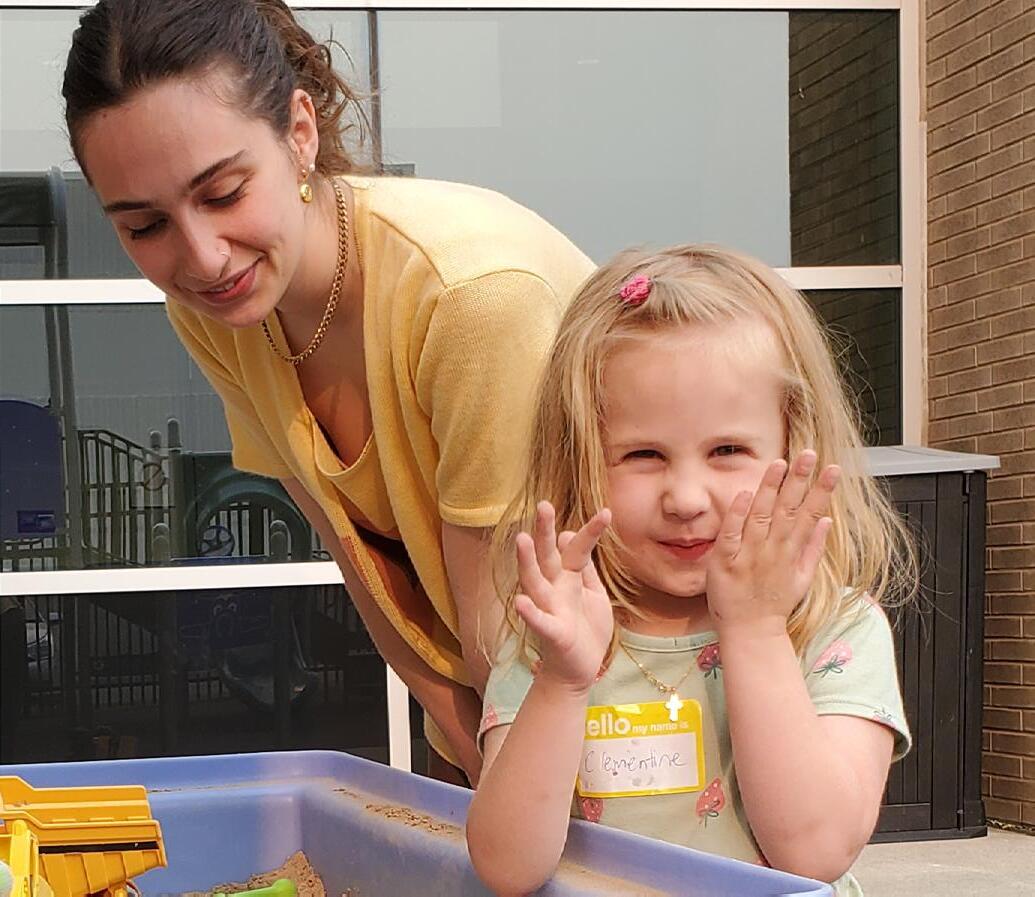
We team up with local experts to supercharge these programs. EarlyON centres bring their preschool know-how to the table, ensuring the littlest participants get the specialized care they need. Plus, Bethesda partners with Niagara College’s Educational Assistant-Special Needs Support Program. This means aspiring educational assistants get hands-on experience, while their dedication and knowledge boost the experience for all.
Respite programs don’t stop at skill development. We also work with local organizations to offer many engaging experiences. Imagine bowling nights at
14
Respite
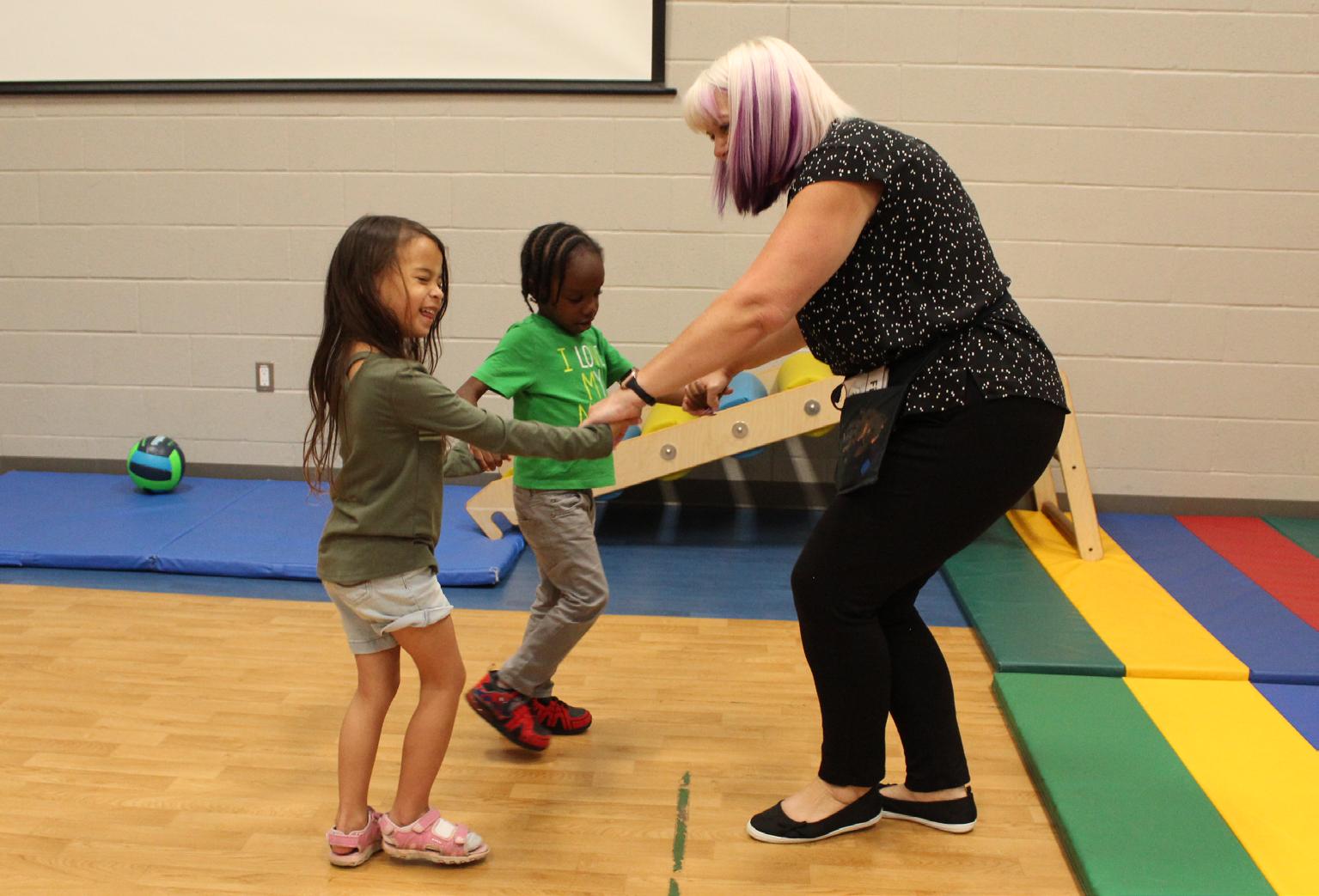
Fairway Lanes Bowling, swimming adventures at Kiwanis Pool, and even exploring the world of trampolines at Aerosports! These partnerships are not just about amusement, though. They also help participants feel like part of a community. By trying new activities and making friends, everyone gets a chance to discover hidden talents and build lasting connections.
“Thank you to the Bethesda respite team for this week’s activities/outings. (Child) had a great time and is already asking when she can come back again. I felt very comfortable leaving (her) in their care knowing they were equipped to handle any difficult moments, which is very reassuring for a
special needs mom,” one parent says.
Another parent shared, “(Child) always looked forward to going to Bethesda for the Respite program. He is asking about it now that the session is over. I believe he had fun, and for us parents, it’s a great opportunity to be able to focus on other things that also matter without worrying about our son.”
That’s the beauty of Bethesda’s ASD Respite Services: a much-needed break for families is provided, while building trust and confidence for the child. Parents know their loved ones are in a safe, supportive environment, free to explore, learn, and grow. Bethesda’s commitment to creating a thriving, inclusive community means every member of the family can flourish. n
Learn more about Respite Services at Bethesda for children and youth.
15
Board Spotlight Board Treasurer Kevin Steinstra

Kevin Stienstra combines financial expertise with a passion for service as Treasurer on Bethesda’s Board of Directors.
His connection to Bethesda came from a friend whose son is supported through Bethesda Children and Youth Services. “He couldn’t say enough good things about Bethesda,” Kevin said. Kevin learned more about Bethesda’s mission and was impressed. “[Bethesda] helps those in our community that need the help the most...They just treat these individuals with such care and respect,” he says. “It is a great organization.”
Five years ago, Kevin decided to take his commitment a step further by joining Bethesda’s board. His financial skillset made a significant contribution, particularly in his role as Chair of the Finance Committee.
Kevin says Bethesda has a great internal finance team. “I certainly don’t have to dig into the accounting and bookkeeping. It’s more of an oversight role.” Every couple of months the finance committee will meet to review the financials to ensure everything is on track.
16
He has lived in the Niagara region his entire life, completing his education at Brock University where he also played basketball for five years. Now, Kevin is a tax partner at Grant Thornton LLP and enjoys keeping active and spending time with his wife and children.
Kevin’s dedication to Bethesda goes beyond his official duties. “Being on the board has been incredibly rewarding,” he says.
Kevin says one of the most rewarding parts about being on Bethesda’s board is hearing from employees of various departments when they share their work’s impact on the organization and the community. This can involve anything from individuals getting out to a Blue Jays game or attending other community events.
His hope for the future of Bethesda is to continue to serve those we support in the best way possible. n


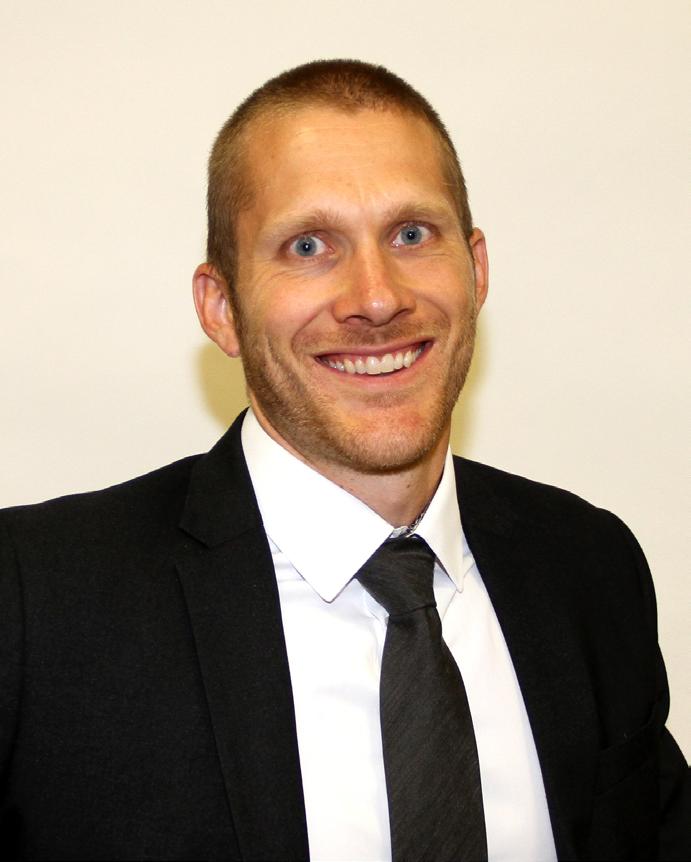
17
Board Spotlight
Board Member Beth Vanstaalduinen
Driven by a desire to give back after her son’s remarkable progress at Bethesda, Beth Vanstaalduinen has become a dedicated advocate for the organization, serving on Bethesda’s Board of Directors since 2020.
Beth’s connection to Bethesda began eight years ago when her son, Jacob, started receiving Intensive Behavioural Intervention (IBI). This marked a turning point for their family, as Jacob began to show significant progress in his developmental milestones. Recognizing the positive influence Bethesda had, Beth felt compelled to give back. When approached by Bill Jackson, Board President, to join Bethesda’s Board of Directors, Beth knew this was the perfect opportunity to express her gratitude.
“It was a way for me to give back,” Beth explains. “I appreciated everything that Bethesda had done for our family.”
Beyond her personal experience, Beth’s hope for Bethesda is allencompassing. She aspires for the individuals supported by Bethesda to “reach their full potential.” It’s evident in her admiration for the staff’s


18
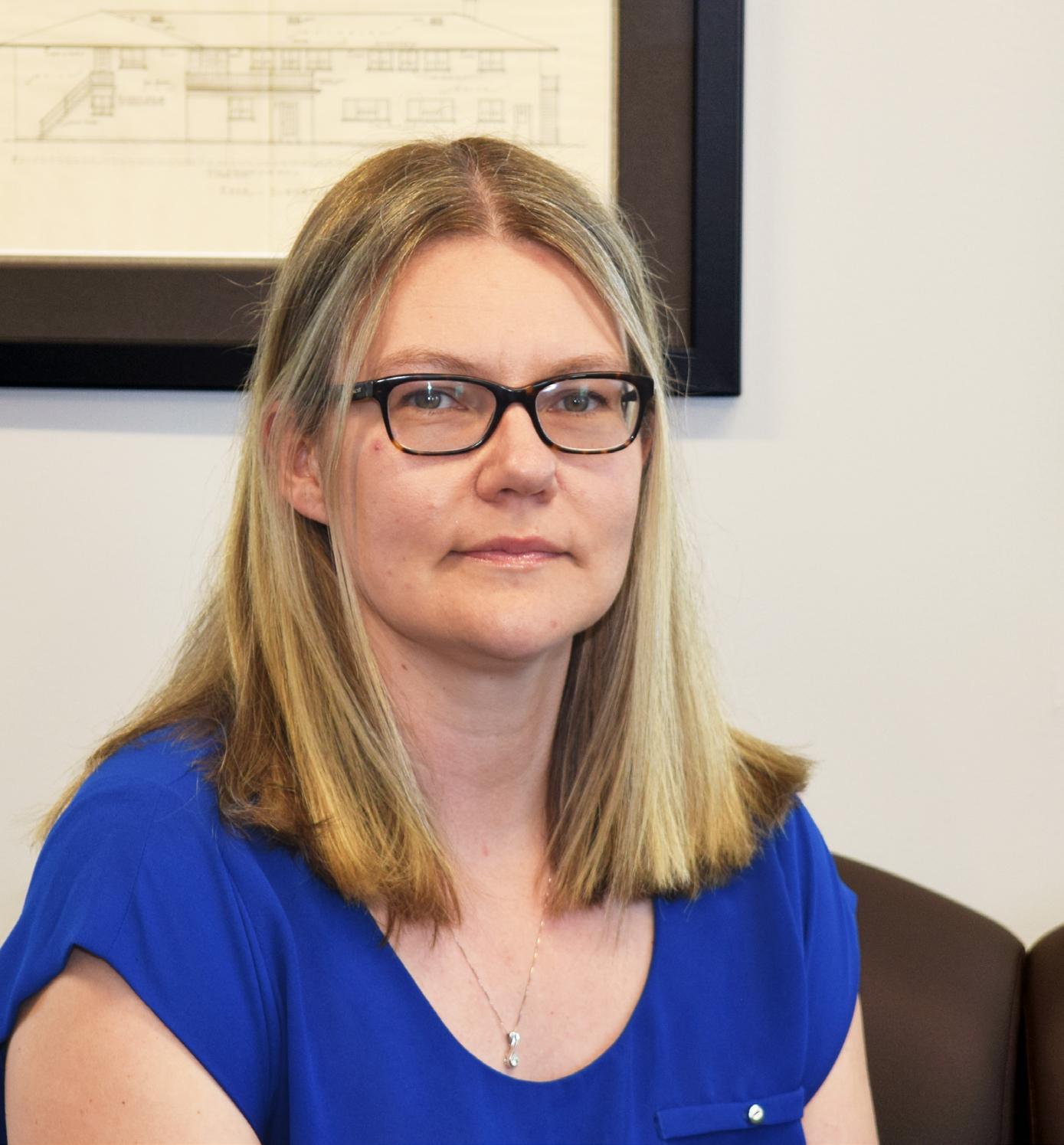
dedication to individualized care, ensuring no limitations are placed on what each person can achieve.
Beth’s most cherished memory with Bethesda stems from her time as a board member. It was attending the first Family Barbeque in years due to COVID restrictions. Witnessing everyone reuniting after a period of separation was truly special. This event held particular significance for Beth, who had joined the board during the pandemic and hadn’t had the opportunity to experience other Bethesda gatherings.
“It was the first one where everyone was able to be back together,” Beth recalls. “So that was special for me.”
Beth’s connection to Bethesda extends beyond her board role. In her position as Assistant Head of School at Althorp Montessori School, she participates in Bethesda’s initiatives with students and staff. Their involvement in Blue Shirt Day for Autism Awareness demonstrates one way Althorp readily joined the cause. This participation stemmed from Beth’s personal connection to Autism awareness and Althorp’s commitment to supporting children with developmental needs. Beth took it upon herself to encourage the school community to raise money for Bethesda during the Blue Shirt Day “Wear and Share” campaign. n
19
NAVIGATE TO SUCCESS
Equipping teens with life skills, confidence, and real-world work experience
Imagine stepping into the world of work for the first time. Excitement, nervousness, and so many questions are likely running through your mind. For teenagers with Autism Spectrum Disorder (ASD), this big moment can feel even more daunting. But, thanks to Bethesda’s innovative Navigate to Success program, a group of motivated teens are gaining the skills and confidence they need to thrive in the job market.
Building Blocks for Success
This 20-week program acts as a springboard, launching teens with ASD into their future careers by focusing on essential life skills. Navigate to Success is all about hands-on learning and building confidence. From cooking meals together to tackling mock interviews, the program provides a supportive environment where teens can learn, collaborate, and prepare for their next chapter.
The program begins with a focus on practical skills that are key to success in any workplace. Teens learn how to manage their finances, while meal planning and cooking sessions equip them with the ability to prepare healthy and affordable meals. Organization becomes second nature as teens tackle task management and create professional resumes – crucial tools for landing their first job.
Beyond the Skills Checklist
Navigate to Success goes beyond simply teaching skills. It’s about empowering young minds. Bethesda’s Children and Youth Services Social Worker leads insightful discussions that encourage self-esteem, confidence, and self-advocacy – all essential assets for transitioning into the workforce. These sessions provide a safe space for teens to discuss challenges and build the emotional intelligence needed to navigate professional interactions.
Volunteer Experiences: Learning by Doing
Learning shouldn’t be confined to the classroom, and Navigate to Success takes this to heart. Volunteer opportunities provide teens with invaluable real-world experience. Not only do they give back to the community, but they also gain soft skills like teamwork, communication, and problemsolving – all skills employers are looking for.
20
Navigate to Success
From Classroom to Mock Interview
As the program progresses, focus shifts to interview preparation. Mock interviews, conducted by Bethesda management, simulate real-life scenarios and provide constructive feedback. These sessions not only help teens refine their interview skills, but also boost their confidence as they head into the job market.
Success Stories in the Making
The program’s impact is evident in the feedback from participants. Teens consistently express appreciation for the volunteer opportunities and view the program as a safe space for social connection and goal setting. Many participants have even set SMART goals (Specific, Measurable, Achievable, Relevant, and Time-bound) to propel them forward after the program ends. Bethesda staff find it incredibly rewarding to witness these teenagers blossom and gain the skills and confidence to succeed.
Launching into the Future
Navigate to Success is more than just a program; it’s a launching pad for future success. By equipping teens with essential life skills, building confidence, and providing real-world experience, Bethesda is empowering a new generation of individuals with ASD to thrive in the workforce. As the program continues to evolve, one thing remains constant: Bethesda’s unwavering commitment to providing teens with the tools, support, and space they need to navigate their path towards a bright future. n
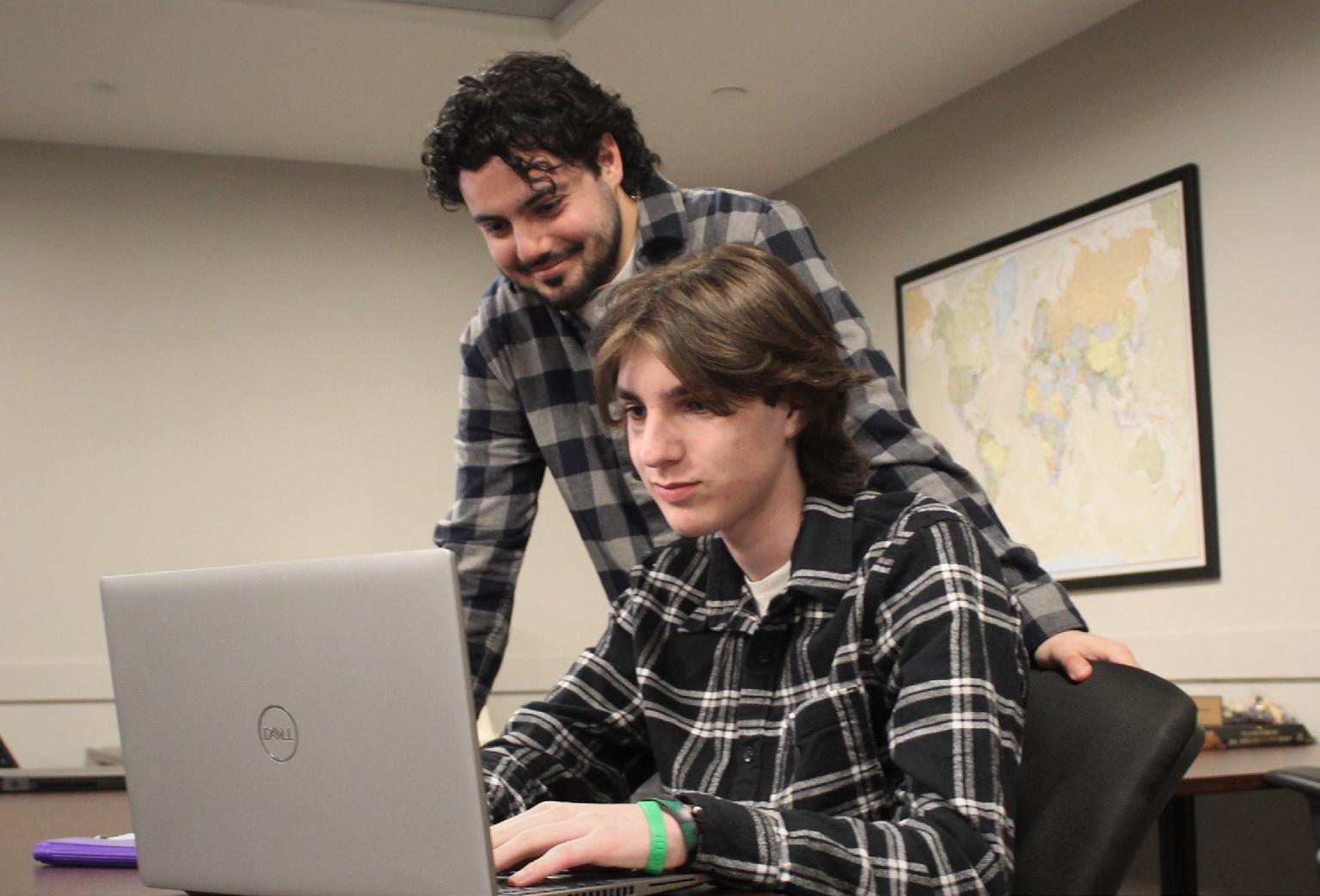
21
“Glass Children”
Nurturing Strong Sibling Bonds in Autism Spectrum Disorder (ASD) Families
While navigating the joys and challenges of siblinghood, families of a child with ASD can use open communication and key strategies to foster strong, lasting bonds between siblings.
For most people, siblings are the first and longestlasting teammates a person will ever have. Sibling dynamics play a critical role in daily life, family dynamics, communication styles, and more. A person’s relationship with their sibling can be filled with both positive and negative emotions. Growing up in close proximity, especially during their formative years, can create a shared intimacy unrivalled by any other platonic relationship they will have in their life. This unique relationship plays a vital role in shaping who a person is.
These sibling interactions are more than just playtime, and include imitation, teasing, shared humour, fighting, pretend play, parallel play, and more. No matter what the encounter looks like, sibling interactions add a rich layer to a child’s development. Siblings become teachers in emotional literacy, helping a person to recognize and express feelings, as well as understand and respond to others’.
For children with ASD, engaging with their siblings might present additional challenges due to social or developmental differences. That being said, it is important to recognize that every child’s experience is
unique, and that their interactions with their siblings, whether typical or unconventional, will still contribute positively to their brain development. Even squabbles and bickering, while disruptive, offer opportunities for the brain to learn and practice skills like emotional regulation and problem solving.
Conversations about the dynamics between siblings where one or more child is diagnosed with ASD have traditionally been focused on the child(ren) with the diagnoses, not the neurotypical child(ren) involved. That is beginning to change with the emergence of a new term to describe the experiences of some siblings of children with high needs – Glass Children.
Glass Child syndrome is not a medical condition or official diagnoses. Instead, Glass Child syndrome is a metaphor that has grown in popularity throughout social media and colloquially amongst siblings of children with physical and/or developmental disabilities and illnesses.
The metaphor of the Glass Child is that siblings of children with high needs may feel invisible, or overlooked (as though made of glass), amidst the focus on their sibling’s needs and challenges.
While not all siblings of high-needs children experience Glass Child syndrome, it can be helpful to implement a few simple strategies to ensure that every child in the home feels safe, visible, and heard within their family unit.
22
Glass Children

1. Be honest and transparent:
Help your children understand their sibling’s challenges, and reassure them that they are not responsible for those challenges. Have a conversation about people having different levels of need depending on what task they are doing, and talk about the strengths and challenges that everyone in the family have.
• This comic strip can be a good conversation starter for discussing people’s differences and levels of support required:
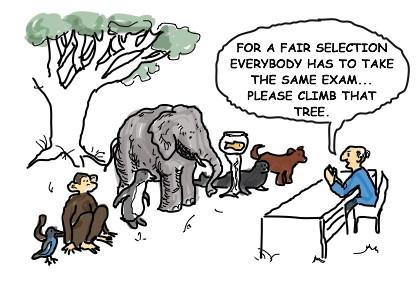
23
2. Acknowledge feelings:
Validate your children’s emotions, no matter what they may be. There is no ‘right’ or ‘wrong’ way to feel about having a sibling with high needs, and it can help your child to process their emotions if they are free to talk about them openly and without judgement.
3. Create dedicated caregiver time:
To a sibling, it can sometimes feel like the child with ASD is always receiving extra time and attention from caregivers. It can help to have a scheduled, dedicated time for each sibling to be 1:1 with each of their caregivers, so that they feel special and equally as supported as their sibling does.
4. Educate about Autism:
Provide age-appropriate information about Autism and other diagnoses the sibling might have, to encourage increased levels of understanding and reduce any anxiety or misconceptions the child may have about their sibling’s diagnosis.
5. Facilitate Sibling Bonding:
Find activities that both siblings may enjoy, and encourage shared experiences, while still maintaining and respecting each child’s individual interests and boundaries. If your child with ASD is not able to engage directly with their sibling, allowing space for parallel play (children playing independently, but in the same area, with the same materials) is another way to create a positive environment for both siblings to enjoy time in.
6. Promote Independence:
While sibling bonding is important, it is equally as important for each sibling to feel that they have their own unique identity. Provide time for each child to pursue independent interests and hobbies, to foster their sense of identity and autonomy.
24 Glass Children
Building strong sibling bonds takes time and effort for all children. Factoring in physical, developmental and/or mental health diagnoses in one or more of the children can dramatically increase the challenges of facilitating a warm and loving sibling relationship. However, by constructing a safe space where siblings learn understanding and empathy, and have support, we can create a nurturing home environment where every child feels valued and included. n

25
Thriving at Home
New Approach Creates Independence and Community
Inclusion with In-Home Care
Imagine living a fulfilling life, managing your daily routine, and feeling confident in your abilities. For adults with intellectual and/or developmental disabilities, it can be difficult to achieve this independence. A new wave of in-home support programs provides a personalized approach, empowering individuals to reach this independence and thrive within their own communities.
Generalized plans of support are counter-intuitive; this innovative specialized model focuses on the individual. Through close collaboration with the person receiving support, their families, and caregivers, a customized plan is crafted to match their needs and lifestyle. This collaborative approach ensures the support aligns with the individual’s vision for their future, creating a sense of ownership and empowerment.
“Our intention was to have James living with us in the family home, but 2 years ago he began eloping… and was hospitalized for over 2 months.”
Susan, mother of James who is one of the first to receive this innovative support model, says the options that were available at the time didn’t fit for their family and James’s needs.
“After visiting the home, we decided that a group living
situation is not where we wanted James to be. In our regular group meetings with Contact Niagara and other individuals that were helping us, we voiced our concerns about the group home living situation and asked if there was any way for us to make an apartment for him and have him live in our home with support.”
This gap in service sparked a collaborative and tailored approach to finding the best solution for James.
“Bethesda advised that they were interested in this type of arrangement and we are so happy that James can continue to live in his home and still get to enjoy meals and family time with us with the support he needs.”
The benefits of a tailored program like this are farreaching, but one of the key advantages is the boost in independence. Support plans are designed to equip individuals with the skills and resources they need to manage daily tasks on their own as much as possible. This not only creates a sense of accomplishment but also builds confidence and self-esteem.
The familiar home environment is one of the biggest benefits of this model. Imagine the comfort and security of your own surroundings! In-home support allows individuals to relax and be themselves, eliminating the anxieties that can arise in unfamiliar
26 In-Home Support
settings. It’s a space where they can truly flourish.
Social inclusion is crucial. In-home support doesn’t mean isolation. These programs help individuals connect with their communities and participate in activities they enjoy. Whether it’s joining a local fitness group, volunteering at a shelter, or attending a neighbourhood gathering, the program provides assistance and encouragement for social engagement.
The impact of personalized in-home support goes beyond daily tasks. By addressing individual needs and promoting independence, it can significantly enhance a person’s overall well-being.
Bethesda: A Commitment to Empowering Individuals.
Bethesda is leading the charge in personalized in-home support with two new in-home support services in place in Grimsby and Niagara Falls.
“Our goal at Bethesda is to empower individuals we support to live fulfilling lives within their communities,” says Paul McGowan, Bethesda’s Chief Executive Officer. “With our new in-home support model, we are providing personalized assistance to help individuals thrive in the comfort of their own homes.”
Bethesda’s program is a testament to their commitment to supporting adults with intellectual and/or developmental disabilities. n
*For anonymity of those involved, names have been changed.

Lifeline for Families: Urgent Response Service Provides Support

For families caring for a loved one with Autism Spectrum Disorder (ASD), managing challenging behaviors can be stressful and isolating. Thankfully, programs like the Urgent Response Service (URS) offer a lifeline.
This collaborative effort provides swift, targeted support to children and youth registered with the Ontario Autism Program (OAP) who are experiencing new or worsening high-risk behaviors.
The Urgent Response Service (URS) is a critical resource for families across a wide range of communities.
“Being a part of the Urgent Response Services team at Bethesda is such a unique experience, because it provides space to integrate diverse perspectives, disciplines and strategies towards building functional solutions for short-term support, as well as fostering resilience and independence for long-term success in the children, youth, and families who come through the program.” – Allison Baxter, Social Worker
But how do families access this vital program? Contact Brant, the Lead Agency for URS in Brant, HaldimandNorfolk, Hamilton, Mississaugas of the Credit First Nation, Niagara, and Six Nations of the Grand River, plays a central role in getting families the help they need. Contact Brant acts as the triage point, conducting the initial screening to determine eligibility and ensuring families are seamlessly referred to the appropriate URS services.
28
Urgent Response Services
Who Can Get Help?
Urgent Response Services for Children with ASD
The Urgent Response Service (URS) is a lifeline for families managing new or worsening challenging behaviors in their child or youth with Autism Spectrum Disorder (ASD) who are registered with the Ontario Autism Program (OAP). These behaviors can put the child, others, or property at risk.
Contact Brant
Guiding you Through Eligibility
Once Contact Brant, the lead agency for URS in several regions, receives the referral, they will contact you to schedule a meeting to assess eligibility. Following this assessment, Contact Brant will connect you with the most appropriate URS service to address your child’s specific needs.
For more information regarding URS eligibility and referral form, visit:
https://contactbrant.net/urgent-response-service/
Getting Started
The Referral Process
If you have concerns about your child’s behaviour, a referral to URS can be made by you, the caregiver, or by a professional who works with your child, such as a clinician, community agency (like Bethesda or Pathstone), school personnel, or hospital staff.
“Amazing therapists from Bethesda... they really listened to our concerns and worked well with my child. They provided useful strategies for us. We also liked a combination of virtual and in-person since we live rural.”
29
What should I expect during Urgent Response Services?
URS uses a multidisciplinary approach. Once screened in, families receive comprehensive support from a team of professionals. The URS team may include:
Behaviour Therapy
Behaviour Therapists (BT) work closely with families to develop behavior intervention plans tailored to the child’s specific needs. They focus on coaching caregiver(s) to use the strategies to teach their child or youth new, appropriate behaviours (i.e. functional communication, coping strategies) in order to help decrease the challenging behaviour. The BT provides direct, weekly support to the family.
“The urgent response service allows us to intervene quickly, preventing crises and promoting positive outcomes. We collaborate closely with families, tailoring strategies to their unique situations.”
- Behaviour Therapist, Sara
Occupational Therapy
Occupational Therapists (OT) address sensory and motor challenges, helping children and youth develop essential life skills. An OT provides consultative support to the family and URS team members to address sensory challenges relating to the URS target behaviour.
30
Urgent Response Services
Speech and Language Therapy
Communication is key, and Speech-Language Pathologists (SLP) assist children in improving their communication abilities. The SLP provides consultative support to the family and URS team members to address communication challenges relating to the URS target behaviour.
“Communication unlocks doors. We work on expressive and receptive language skills, fostering connections between children and their loved ones.”
- Speech-Language Pathologist, Mimi
Mental Health and Wellness Professionals
Emotional well-being is prioritized, and mental health specialists provide guidance and coping strategies. Our URS team includes a Social Worker and a Psychotherapist. They may provide consultation support to the family and URS team members as well as 1:1 support to the child/youth in relation to the URS target behaviour.
Therapeutic Respite Support
Therapeutic Respite services offer a break for caregivers in a safe environment at our center. There is also respite support available in the community from community providers. Our URS team works with the respite support workers to offer meaningful, goaloriented service.
The Urgent Response Program at Bethesda exemplifies the power of collaboration, compassion, and expertise. By addressing urgent needs swiftly, it empowers families to navigate the complexities of Autism with confidence and hope.
For more information and the referral process, connect with a Service Coordinator at Bethesda. n
31
Learn more about the Urgent Response Service.
Bethesda Culture
“What’s been really empowering and really great is the fact that individuals and their care providers are saying thank you for being the ones that stay. I think that’s really important, that we’re the ones that stay involved and continue to provide support, demonstrating that we care.”
Katrina Frausel Behaviour Therapist, Community Response Program

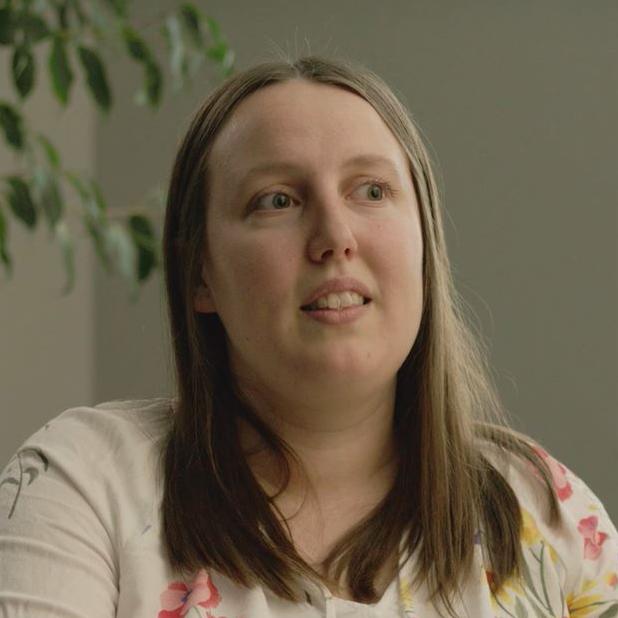
“I think being here for 39 years; I worked with people when they were in their 20’s. And now we are almost 40 years later and they are going into their senior years. So seeing growth, seeing change, seeing the milestones that we all experienced, I’ve had the blessing of being able to live those with people.”
Shelley Mercer Director, Adult Services
“So we work with a lot of littles, and I love little kids, honestly, they’re amazing. The progress since the start of the program this year in March to now, the kiddos come in and go to their cubbies. The first couple weeks the transition was a little difficult but now we don’t really have to prompt some of the kiddos as much. Now they just come running, go to their cubbies, take off their jackets and shoes. And just seeing that little progress right there is completely rewarding.”
Theresa Brown ABA Interventionist, Children and Youth Services
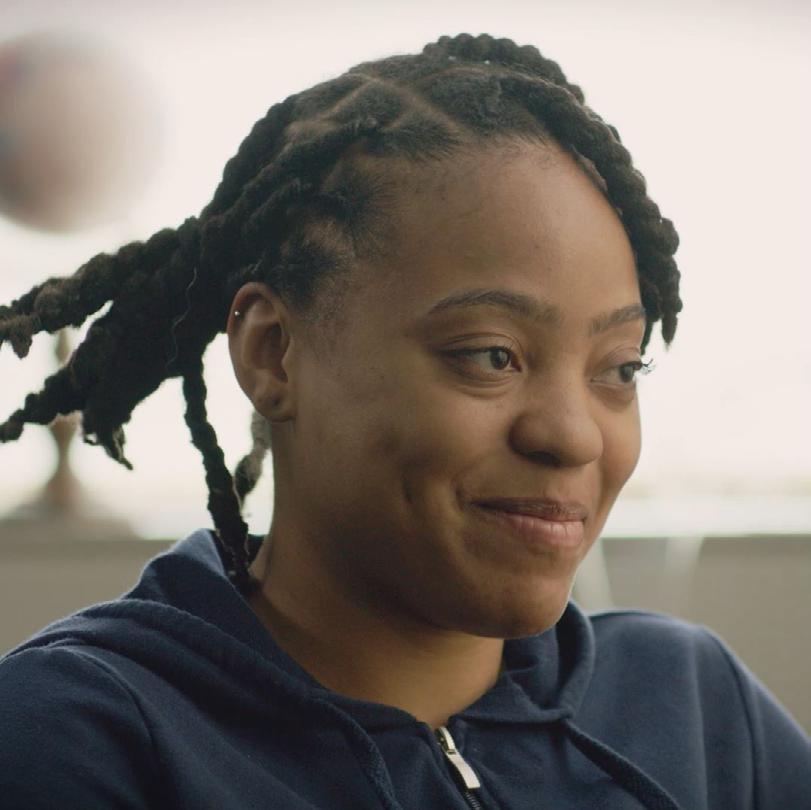
32
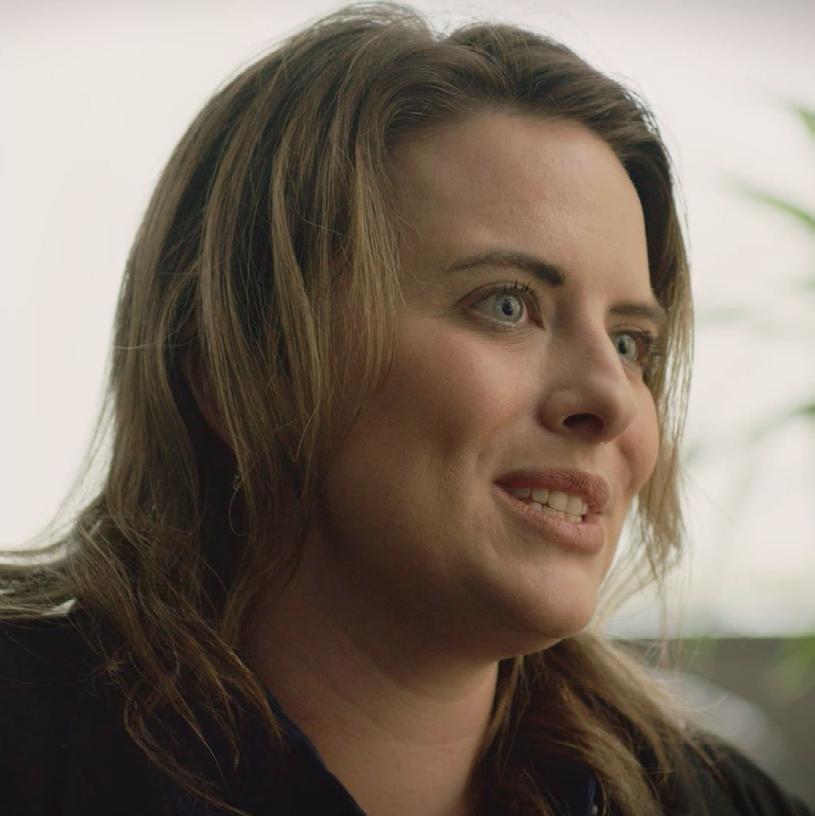
“You’re not dealing with just a person in isolation, it’s always the systems that are around those people that play a huge role in the people that we support. I have lived experience of a family member who has a developmental disability so I feel I have that lens a little bit of looking at how this impacted the family. I do think that we really do look at that. When I worked in Children’s Services that was always my favourite part. We used to go into the homes and do family support and I always enjoyed that the most. Just building that relationships with the family and understanding the person. Not just in isolation but within the system that they are living in.”
Janine Costello Clinical Resource Consultant, Adult Clinical Services
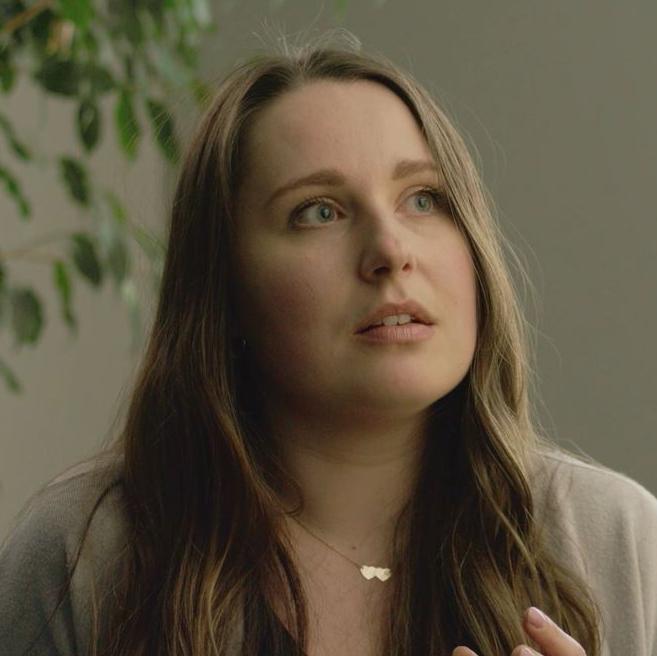
“My job is to connect and make sure that justice professionals, lawyers, judges, corrections – they understand developmental disabilities. So I’m an advocate, making sure that the lawyers understand you know this way to communicate with the individual may not work. They may need more time. They may need a different way of explaining ”
Samantha Tullo Dual Diagnosis Justice Case Manager, Adult Clinical Services
33

Bethesda INSERT VIDEO
Culture

INSERT VIDEO
Community Partner Spotlight

For 17 years, C.R. Smith Financial and Bethesda have worked together, proving that shared values and a commitment to community can create a powerful partnership. Magic happens when organizations with similar goals join forces. This collaboration exemplifies the power of aligning values and building trust.
Beyond Business: A Commitment to Community Engagement
Doug Smith, founder of C.R. Smith Financial, expresses immense pride in the long-standing partnership built with Bethesda. Doug says witnessing the positive impact on both the organizations and the community serves as a significant source of personal fulfillment.
“I think I’m most proud of the relationships with so many different people [at Bethesda] over the years… The relationships in that way are really important to me, and the support we’ve tried to give to watch Bethesda do better and better and better.”
Doug and the team at C.R. Smith Financial are no strangers to rolling up their sleeves for a good cause. Their commitment to giving back shines through their active involvement in community initiatives.
The Wise Guys Charity Fund, the volunteer driven brainchild of Doug and his father, plays a starring role in supporting local organizations like Bethesda with grants and fundraising events.
The entire C.R. Smith Financial team is a familiar face at community events and initiatives, including those hosted by Bethesda.
They joined in Bethesda’s World Autism Awareness Day ‘Wear and Share’ campaign, where Bethesda staff and the community donned blue shirts to show support and raise awareness for Autism. It’s clear that Doug and his crew believe in putting their money (and their time) where their heart is.
CR Smith Financial: More Than Just Financial Services
C.R. Smith Financial offers a comprehensive suite of services designed to empower individuals and organizations alike. Beyond traditional insurance and financial products, the company provides employee benefits solutions, individual insurance plans, and financial planning guidance. This holistic approach ensures clients receive well-rounded support for their financial security.
Its services are designed to enhance the overall wellbeing of Bethesda’s employees. Employee benefit plans promote financial security and access to quality healthcare, aligning well with Bethesda’s mission of providing exceptional care. C.R. Smith Financial’s expertise helps Bethesda optimize benefit plan costs, ensuring more resources are directed towards critical programs and services.
36
Community Partner

A Blueprint for Success: Partnering for a Greater Good
Doug extends valuable advice to other businesses considering partnerships with non-profit organizations. He emphasizes the importance of genuine collaboration, highlighting the positive impact it can have on both the community and a company’s reputation. Partnering with organizations like Bethesda allows businesses to give back while fostering a culture of social responsibility, ultimately strengthening their connection to the local community.
Giving back to organizations like Bethesda isn’t a business transaction; it’s an opportunity to contribute to a cause that directly impacts the lives
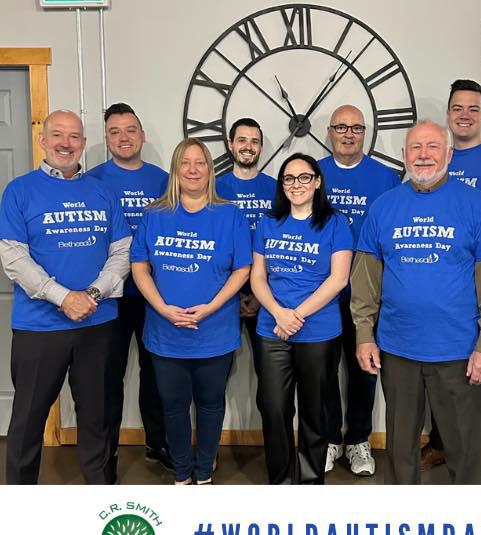

of others. Doug encourages individuals and businesses to actively research potential recipients of their support, emphasizing the importance of transparency within nonprofit organizations.
“Do a little bit of research. Find out, in the organization you’re potentially considering supporting, how many people it touches across Niagara and where the money is going. And if you do that, it will be be at Bethesda or another organization that’s doing it the right way. Those are the ones you’re going to want to support.”

By fostering a partnership built on shared values, trust, and a commitment to community, C.R. Smith Financial and Bethesda have created a model for successful collaboration. Their dedication to employee well-being and community engagement serves as an inspiration for businesses and organizations alike. n
37


There are many ways you can contribute to Bethesda and support those we serve. From one-time donations, to monthly giving, legacy gifts, and community partnerships, there are countless ways you can make a difference in someone’s life today.
Ways to Donate
To discuss the options available or to get your questions answered, call 905.684.6918 ext. 378 or email merb@bethesdaservices.com.
The Bethesda Foundation, a registered charity in Ontario, Canada, reflects the Board of Directors’ passion for supporting children, youth, and adults with intellectual and/or developmental disabilities. The foundation raises funds to fulfill the community’s unmet needs and promotes the programs developed by Bethesda. Bethesda has operated as a charitable organization since 1937. We greatly appreciate the contributions of our many supporters, without whom we could not carry out our mission.
38
Foundation
Would you like to support Bethesda? ADVERTISE with us in the next issue of Inspire magazine
905.684.6918
info@bethesdaservices.com
Contact us
or
Are you a PARENT or CAREGIVER of a child with Autism Spectrum Disorder (ASD) or another developmental disability
Don’t miss our Summer Service Guide! This guide is packed with FREE and IMMEDIATELY ACCESSIBLE workshops, groups and family events for children, youth and parents and caregivers. ?
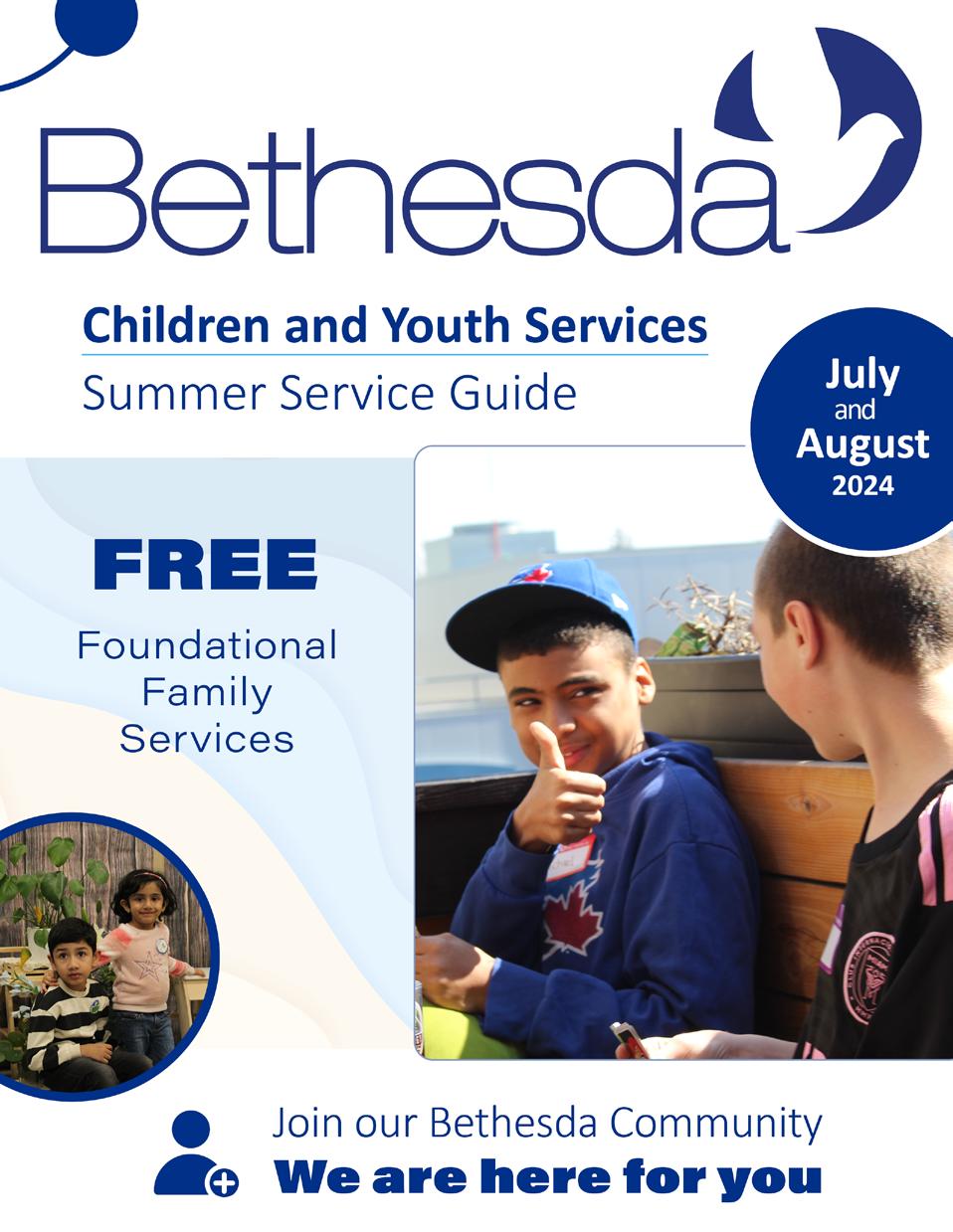

Click here to view the Summer Service Guide now!
International Day of Persons With Disabilities

International Day of Persons with Disabilities is celebrated around the world on December 3. The observance of this day aims to promote an understanding of disability issues and to mobilize support for the dignity, rights, and well-being of all persons with visible or invisible disabilities. It is a day to celebrate diversity, and acknowledge the unique contributions of all persons!
Anti-Bullying | Pink Shirt Day
On Feb. 28, Bethesda staff members donned “Choose Kindness” shirts to show support for Pink Shirt Day and to raise awareness of bullying in schools, workplaces, homes and online.
Chief Executive Officer, Paul McGowan shares, “As an organization that provides compassionate care, it’s important for our leadership and staff to present a unified stance against bullying. We support a demographic that can be particularly susceptible to bullying and mistreatment, so I see it as Bethesda’s responsibility to show our support and educate those we provide services to in any way that we can.”
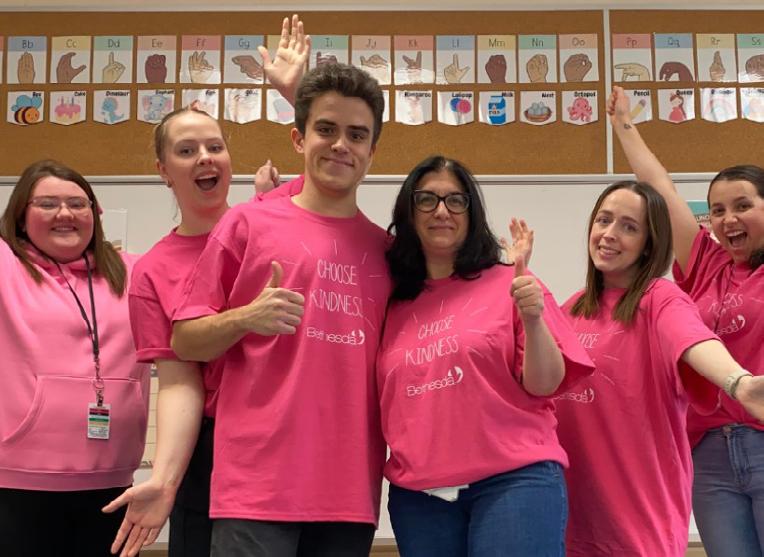
World Autism Awareness Day | Blue Shirt Day


April 2 is World Autism Awareness Day.
We wear blue to show our support for children, youth and adults with Autism and other intellectual and/or developmental disabilities, and to celebrate the incredible diversity they bring to our world.
Bethesda staff, friends and community partners participated by wearing blue and sharing photos!
Bethesda Volunteer of the Year
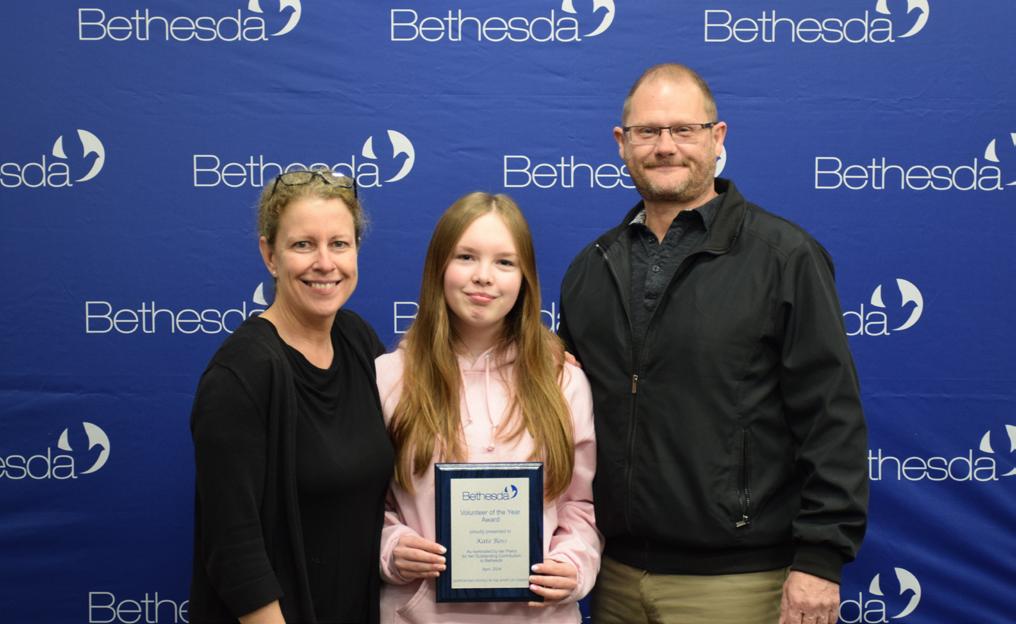
We are pleased to Announce that Bethesda’s Volunteer of the Year is Kate Ross. Kate, the daughter of a cherished Bethesda employee, has continually demonstrated her kind spirit and willingness to help. Kate has volunteered to assist with multiple Bethesda events such as the Family BBQ, Summer Breeze Social, and Tim Hortons’ Holiday Smile Cookie Campaign. It is through the assistance of volunteers like Kate that we can hold events to, for and in further support of people. Congratulations Kate!

Bethesda Employee of the Year
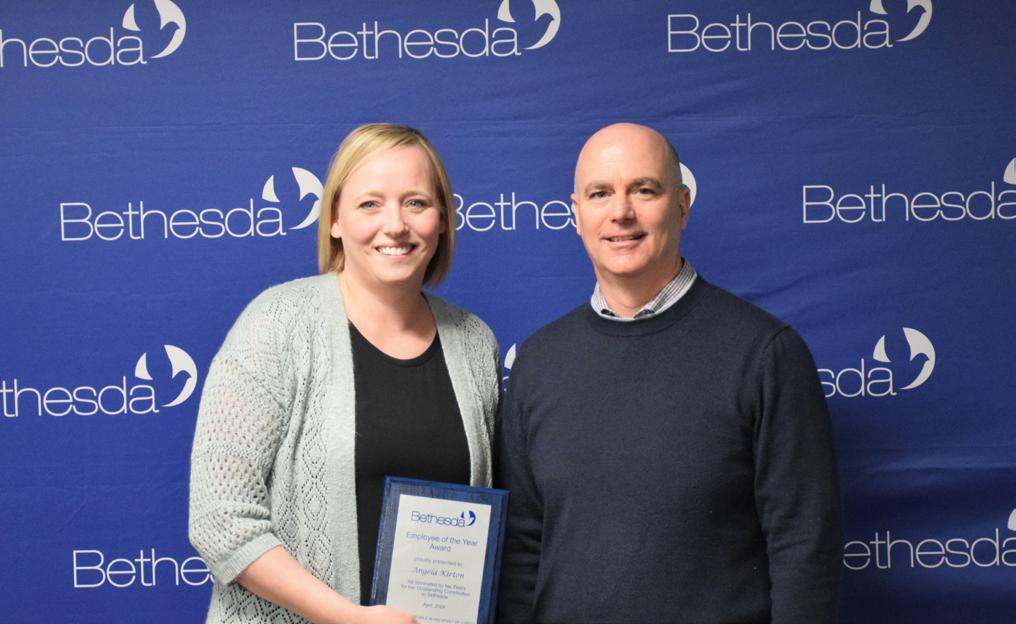
Bethesda’s Employee of the Year is Angela Kirton. Angela joined Bethesda in 2010, beginning her career as an Instructor Therapist within Bethesda’s Children and Youth Services. Through Angela’s dedication for knowledge and skill building she has progressed to Clinical Supervisor and now shares the knowledge she has gained with her team. Angela embodies Bethesda’s Mission, Vision, and Values, continually striving to enhance the lives of children, youth, and their families. Congratulations Angela!

Support Bethesda

Empower
42
Donate Now Visit bethesdaservices.com/en/ foundation/donate or phone 905.684.6918 ext. 356 info@bethesdaservices.com
Donate now
Monthly Giving
Bethesda’s impactful mission
considering a commitment to regular donations, ensuring sustained support for children, youth and adults with intellectual and/or developmental disabilities within our community.
your desired donation frequency
dropdown menu to set up automated contributions.
by
Choose
from the
43 CONTACT Contact us Bethesda is a supportive community that motivates and empowers individuals of all ages with intellectual and/ or developmental disabilities, along with their families, to embrace their fullest potential. Reach out to discover how we can support you and your family in living your best lives. bethesdaservices.com info@bethesdaservices.com 905.684.6918
bethesdaservices.com





















































